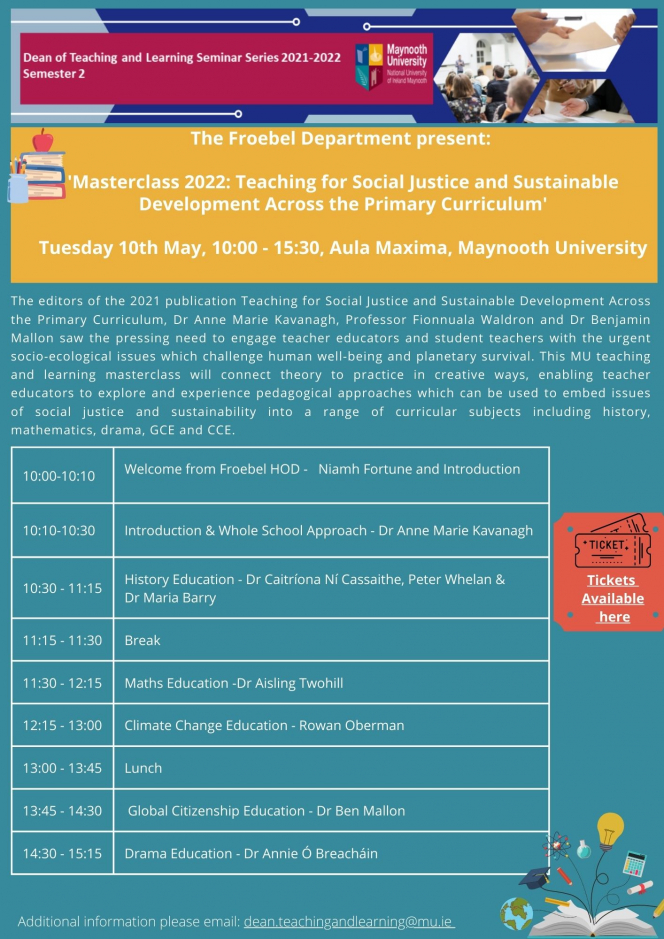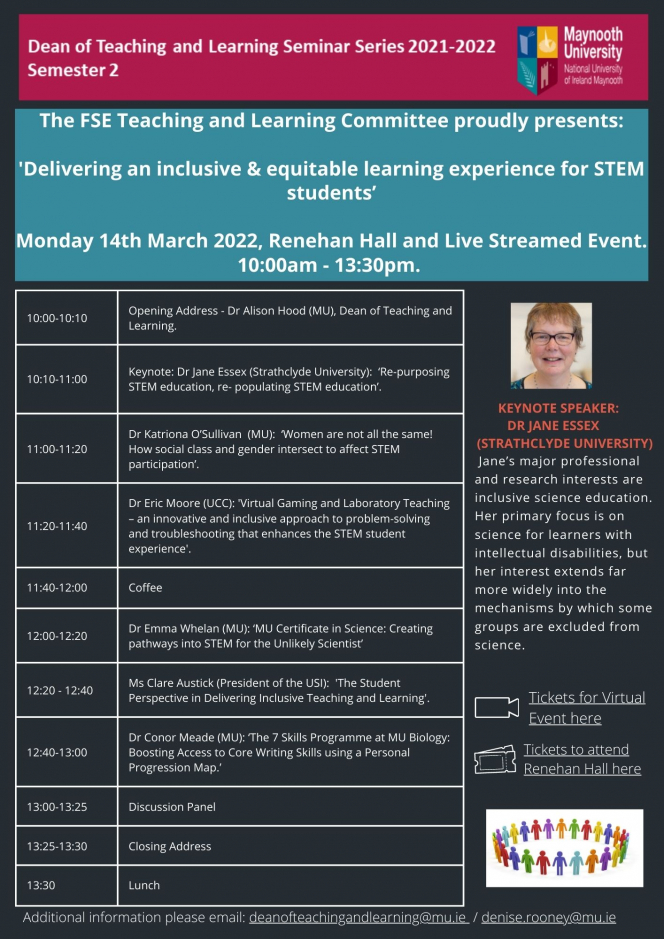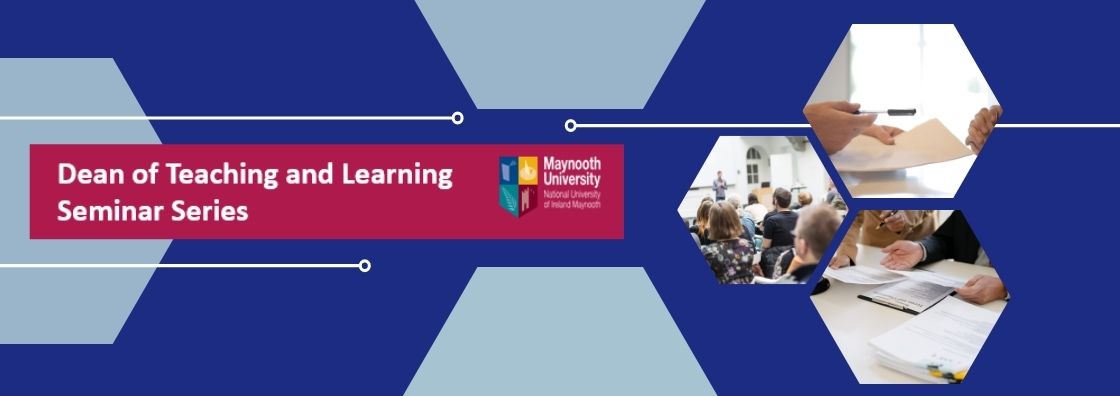Office of the Dean of Teaching and Learning
ToggleThe AX 1 Sessions
The AX1 Sessions: A Masterclass Series in Good Design & its transferability into the Higher Education Classroom
All of the masterclasses will focus on understanding how professional designers have developed the skills of intellectual curiosity, creativity, adaptability, and empathy in their work, and how this understanding might help lecturers consider alternative ways of fostering these skills in the classroom.
Masterclass Series Details:
Thursday 29 February – Leah O’Donoghue, Illustrator and Visual Note Taker
Thursday 7 March – Eimear Mc Nally, Visual Facilitator and Graphic Recorder - 'Facilitating Learning: How Can I Bring Creative Participatory Practices into My Teaching and Learning'
AX 1 Sessions
Thursday 14 March – Graham Nolan, Head of Design Accenture Song Ireland - 'Why Personas are Dead'
AX1 Sessions 2
Venue:
AX1, Auxilia Building, North Campus.
Each of the speakers will prepare a Design Thinking exercise which will be completed by the attendees at the end of each masterclass, which will see them consider how they could transfer what they have learned about fostering in intellectual curiosity, creativity, adaptability and empathy, and how they could apply this to their own Teaching and Learning.
Seminar Series Poster 2023-2024
Learning through Praxis: Developing community partnerships for holistic education and social change
Learning through Praxis: Developing community partnerships for holistic education and social change
Dr Jerry Shannon, Assoc. Professor, Departments of Geography and Financial Planning, Housing, and Consumer Economics, and Director of the Community Mapping Lab, University of Georgia
Wednesday, 6 March 2024, 10am-2pm, MUSSI Seminar Room, Iontas Building, 2nd Floor
The Dean of Teaching and Learning in conjunction with the Department of Geography are delighted to host this event.
Masterclass Details
9.30am -10.00am: Welcome Refreshments, MUSSI Kitchen
10.00am-11.30am: Session 1: Community geography, social engagement, and the public university classroom
A core argument for community-engaged pedagogy is that it places learning in its social context. Through work outside the university, students do not just gain real world experience. They also engage with ethical questions about how their work is beneficial for a broader public and how best to create a better society. In this talk, I describe how one framework for engaged scholarship, community geography, provides a model of engaged scholarship, describing how the Community Mapping Lab at the University of Georgia has provided students with opportunities to work with a diverse range of community partners around issues of race and social inequality in our university town. An open discussion will follow the talk.
11.30am -12.15pm: Lunch break and informal discussion, MUSSI kitchen
12.15pm -1.45pm: Session 2: Workshop: Building equitable partnerships for engaged learning and social change
Community engagement within universities often takes the form of community service, with students volunteering to support local organizations. Yet community engagement can be more than just service. In this workshop, participants will work through key guidelines for building mutually beneficial, socially transformative partnerships with community partners in their courses.
1.45pm -2.15pm: Refreshments and informal discussion, MUSSI kitchen
Dr Jerry Shannon is an Associate Professor in Geography and in Financial Planning, Housing, and Consumer Economics at the University of Georgia. His broad interests are in urban development and inequality, geographic information systems, and place effects on health. More specifically, his research focuses on the role of maps and spatial analysis in shaping our understanding of hunger, housing, poverty, and neighborhood development. He is also interested in the role of participatory research methods in mobilizing community action around these issues. He is Director of the Community Mapping Lab at UGA. He has published in Annals of the American Association of Geographers, Progress in Human Geography, Social Science and Medicine, American Journal of Public Health, and Health Affairs.
This Masterclass is co-funded by the Dean of Teaching and Learning and the Department of Geography. Thank you also to MUSSI for supporting this Masterclass.
The Masterclass is available for all Maynooth academic and research staff and postgraduate research students. If you have any questions about this event, please contact Prof Karen Till: karen.till@mu.ie
Shannon Seminar Series Poster
Teaching the Environmental Humanities
Date: Friday 8th March 2024
Time: 11am to 2pm, with lunch provided
Venue: Library room C&D
The Dean of Teaching and Learning Seminar Series is delighted to host this masterclass in conjunction with Dr Stephen O’Neill and Dr Rita Sakr, Department of English. The talk and workshop, led by Prof Graham Huggan, are aimed at supporting and developing good practice and innovative methods in teaching and learning in the broad area of the Environmental Humanities. The masterclass coincides with Social Justice Week and Green Week, and it is open to colleagues and postgraduate students (taught and research) across MU. Providing a forum for reflections on teaching and learning practices and strategies in the areas of the environmental humanities, postcolonialism/decoloniality, climate studies and environmental justice. The main objectives of this masterclass are:
- Envisioning intra- and cross-Faculty collaborations in this area to potentially develop teaching and learning frameworks for the future directions of MU’s cross-disciplinary and interdisciplinary research focus on environmental studies, especially but not exclusively in the context of the humanities.
- Exploring possible degree pathways in the environmental humanities building on established offerings across departments.
Professor Graham Huggan (School of English at the University of Leeds) is a leading scholar across three fields: postcolonial studies, environmental humanities, and tourism studies, all of which come together in his monograph, Colonialism, Culture, Whales: The Cetacean Quartet (Bloomsbury, 2018). His latest book is the co-authored Modern British Nature Writing, 1789-2020: Land Lines (Cambridge University Press, 2022), and current pursuits include running a doctoral programme in Extinction Studies and co-leading an international research project on European national parks. Professor Graham’s publications include Nature's Saviours: Celebrity Conservationists in the Television Age (Routledge, 2013); the Oxford Handbook of Postcolonial Studies (Oxford University Press, 2013); the co-authored Postcolonial Ecocriticism: Literature, Animals, Environment (Routledge, 2010; second edition 2015); Australian Literature: Postcolonialism, Racism, Transnationalism (Oxford University Press, 2007); Extreme Pursuits: Travel/Writing in an Age of Globalization (University of Michigan Press, 2009); the volume of essays Interdisciplinary Measures (Liverpool University Press, 2009); and the monograph The Postcolonial Exotic: Marketing the Margins (Routledge, 2001).
Please contact Dr Stephen O’Neill (stephen.oneill@mu.ie) or Dr Rita Sakr (rita.sakr@mu.ie) for further details and to receive reading material for the workshop after you have registered.
Enhancing Student Engagement Post Covid
Date: Tuesday 9th May 2023
Time: 1.15pm to 2.30pm
Venue: SE014, School of Education Building.
The Dean of Teaching and Learning Seminar Series is delighted to welcome Dr Harriet Dunbar-Morris to Maynooth University to host this Masterclass in conjunction with the School of Law and Criminology. Dr Dunbar-Morris is the Dean of Learning and Teaching at the University of Portsmouth. Her expertise is in teaching and learning, student engagement, student experience and widening participation. She has worked on research projects on the student experience of teaching and learning; the transition to HE; widening participation to HE; and admissions to HE.
In this Masterclass, Dr Dunbar-Morris will focus on ways to understand and enhance student engagement in the classroom and to explore challenges and opportunities for student engagement in the post-Covid era. This will be largely based on Dr Dunbar-Morris’ own research in this area, notably her 2021 article on student engagement in blended and connected learning and teaching, which explored engagement opportunities in this regard. Dr Dunbar-Morris will explore the engagement-related challenges in the provision of blended learning and how these can be improved in practice.
Enhancing Student Engagement Post Covid
Teaching Migration in the Humanities and Beyond .....
Teaching Migration in the Humanities: New Methodologies and Interdisciplinary Opportunities.
Date: Thursday 4th May
Time: 11am to 2pm, with lunch provided
Venue: Room 1.37, Iontas Building.
The Dean of Teaching and Learning Seminar Series is delighted to host this masterclass in conjunction with Dr Rita Sakr, Department of English, that is aimed at supporting and developing best practice and innovative methods in teaching and learning in the broad area of migration primarily in the FACSP while being open to colleagues across MU, with respect to:
1) Designing cross-departmental modules and programmes while rigorously addressing the challenges and opportunities offered by such collaborative initiatives (taking into consideration (inter)disciplinary frameworks, assessment strategies, etc.)
2) Identifying specifically relevant employability skills for implementation in module design/course curriculum
3) Integrating research-led teaching with engaged and partnership research pathways through experiential learning (especially by involving the NGO and IGO sectors).
4) Establishing frameworks for continued, sustainable intra- and inter-faculty collaboration in teaching and learning development in the area of migration studies through workshops, conferences etc.
Professor Parvati Nair, former Head of the School of Languages, Linguistics and Film, Queen Mary University of London; Professor of Hispanic, Cultural and Migration Studies; and previously Founding Director of the United Nations University Institute on Globalization, Culture and Mobility, will deliver this masterclass that aims at setting a very solid groundwork for further teaching and learning development opportunities for the significant number of FACSP, and more broadly MU, colleagues involved in teaching in the broad area of migration; for curricular revision of relevant programmes and the exploration of further collaborative possibilities (including interdisciplinary undergraduate pathways and doctoral programmes in this area); and for embedding state-of-the-art methods with respect to integrating interdisciplinary research-led teaching with experiential learning and public engagement in the field of migration.
Please contact Dr Rita Sakr for further details - rita.sakr@mu.ie.
Teaching Migration in the Humanities and Beyond
23 March 2023: Carpe Diem - Blended Learning - Purpose and Outcomes 1: E-tivities Workshop
The Dean of Teaching and Learning Seminar Series, in conjunction with the School of Modern Languages, Literatures and Culture, is pleased to welcome Professor Gilly Salmon to Maynooth University on Thursday 23rd March to facilitate a workshop in the Flexible Learning Room, First Floor, MU Library from 9am – 1pm.
The workshop aims firstly to provide further clarity around blended learning and its various forms in the higher education context and then proceeds to engage attendees in exploring the learning and development process necessary to develop a well-informed, pedagogically effective and fit-for-purpose approach to blended learning suitable to the MU context. This will involve discussions around teacher transformation in the technological age.
Professor Gilly Salmon is founder and C.E.O of Education Alchemists Ltd - a company formed around her life's work including Carpe Diem learning design methodology, pedagogical transformation, online teaching, technology enhanced learning, the 5 stage model and e-tivities.
Carpe Diem - Blended Learning - Purpose and Outcomes 1: E-tivities Workshop
'Anti-Blackness and Other Racisms in the Irish University Today'

We are delighted to introduce our next seminar as part of the Dean of Teaching and Learning Seminar Series 2022-2023 for this semester, chaired by Dr. Thomas Strong (Anthropology) and Rebecca King O'Riain (Sociology):
Title: "Anti-Blackness and Other Racisms in the Irish University Today".
Date/Time: Thursday 24th November, 10:00am-12:00pm,
Location: SE230, School of Education Building, North Campus, Maynooth University
How are specific, but enduring, structures of racism comprehended by contemporary concepts? Can the University address equality, diversity and inclusion without talking about racism?
Welcoming our Keynote speaker Ebun Joseph, Ph.D. Author of Critical Race theory and Inequality in the Labour Market: Racial Stratification in Ireland (Manchester UP, 2020).
Masterclass 2022: Teaching and Learning for Social Justice and Sustainable Development.

The Froebel Department proudly present: Masterclass 2022: Teaching and Learning for Social Justice and Sustainable Development.
Date and Time: Tuesday 10th May 2022, 10:00-15:15.
Location: Aula Maxima, South Campus, Maynooth University
The editors of the 2021 publication Teaching for Social Justice and Sustainable Development Across the Primary Curriculum, Dr Anne Marie Kavanagh, Professor Fionnuala Waldron and Dr Benjamin Mallon saw the pressing need to engage teacher educators and student teachers with the urgent socio-ecological issues which challenge human well-being and planetary survival. This MU teaching and learning masterclass will connect theory to practice in creative ways, enabling teacher educators to explore and experience pedagogical approaches which can be used to embed issues of social justice and sustainability into a range of curricular subjects including history, mathematics, drama, GCE and CCE.
‘Delivering an inclusive & equitable learning experience for STEM students’ - The FSE Teaching and Learning Committee
The FSE Teaching and Learning Committee proudly presents:
‘Delivering an inclusive & equitable learning experience for STEM students’.
Monday 14th March 2022, Renehan Hall
10:00am - 13:30pm.

‘Maximising the PhD Supervision Experience: Two Sides of the Story’ - Dr Noelle Higgins and Dr Gerard Maguire:
We are delighted to welcome:
Dr Noelle Higgins (Maynooth University) and Dr Gerard Maguire (Nottingham Trent University) presenting: ‘Maximising the PhD Supervision Experience: Two Sides of the Story’.
Virtual Event - Date and Time: Monday 14th Febrauary 2022, 1pm - 2pm
'Learning my Lessons: Pedagogy Evolution within a Quality Teaching Framework' - Dr John Keating
Dr John Keating (Maynooth University) discussing 'Learning my Lessons: Pedagogy Evolution within a Quality Teaching Framework'.
Virtual Event on Wednesday, 15th December 2021
This seminar is a critical discussion and reflection of my evolving personal pedagogy and its impact on teaching quality.
Specifically, I will discuss the following topics:
The importance of Basics; Personal Pedagogy, Teaching Philosophy, and Teaching Fundamentals.
Pedagogy and the construction of Learning Environments (Offline, Online and Blended)
Pedagogy and Course Evolution using the SIAM Process
Evolving Assessment Strategies for/of/as Learning (Enculturation and Transformation)
Managing High-Value (50%; 100%) Continual Assessment Modules
Assessment and Accommodation Strategies (Fairness, Collaboration, Literacy Development, Inclusion)
Lectures, Lessons and the Creation of Reusable Learning Objects (Laurillard’s “Teachers’ Constructed Environments”)
Encouraging and Supporting Reflective Practice and Writing
The impacts of the Toxic Ego, Digital Fatigue, and The Law of Diminishing Returns
I will also discuss the interrelationship between pedagogy evolution and technology supported learning environments. I will provide some practical insight into my use of technologies to support my pedagogy, and vice versa. This will include:
My Online Live Streaming and Lesson Recording Setup (YouTube; Engagement)
My Approaches to Supporting Learning, Collaboration and Assessment using Technology
Pedagogical Tools, Active Learning and Sense Making
Finally, I will talk about the introduction of Quality Teaching Framework Models and how I think these could enhance my teaching quality and that of the wider higher-education community.
This interactive seminar will be live-streamed via YouTube on Wednesday, 15th December 2021, 3:00PM-4:00PM. You may access the Live Stream using this link.
Dr John G Keating is an associate professor in the Department of Computer Science at Maynooth University. John has been active in teaching and learning in higher education for over thirty years. His undergraduate degree was in Physics and Mathematics and for his PhD studied Atmospheric Physics. He also holds MEd and EdD degrees. His EdD research focussed on applied linguistic evaluation of collaborative science writing and discourse in online learning environments at secondary level.
‘Socratic Dialectic in the Classroom Why, When, and How to Lead a Discussion’.- Prof. Scott Crider (University of Dallas)
Professor Scott Crider (University of Dallas) discussing ‘Socratic Dialectic in the Classroom Why, When, and How to Lead a Discussion’.
Thursday, October 14th, 2021, at 3:00pm
Abstract: After defending Socrates and Socratic dialectic (as seen in Plato’s Euthyphro) as ultimate models of the teacher and the teaching method, respectively, I explore the why, when, and how. The ‘why’ examines the relationship between the two dominant modes of teaching—lecture and discussion—and argues that, although both have merits, lecture alone will fail to fulfil all of our pedagogic goals, one of which is teaching students the art of interpretation. This is the ‘when’, and here I examine the way that discussion upon a text, properly guided, can not only inspire, discipline, and profit student responses from mere opinion to reasoned opinion, but also produce understanding for student and teacher alike, understanding not had by any one participant beforehand, even the teacher. The ‘how’ offers a series of discursive moves arranged into steps, imperfectly illustrated with a sample from one of my own literature classes as captured on Zoom. The conclusion suggests that such class discussions are one means to liberal education since it liberates students from professorial interpretation toward their own, a liberation, though, guided by the professor. Paradoxically, the professor does not profess, but shows others how to profess.

